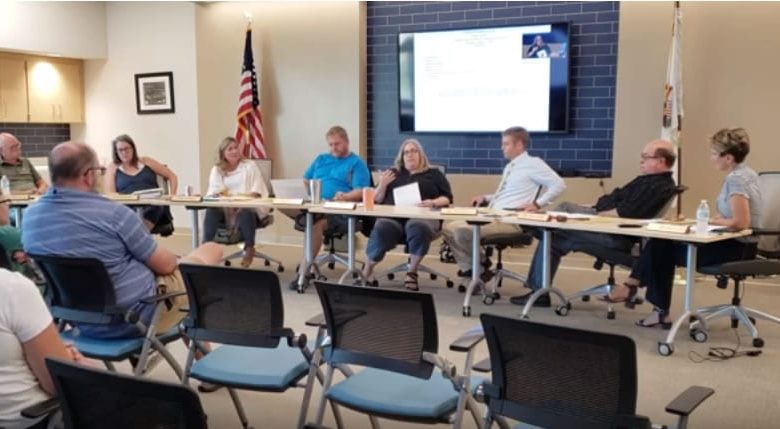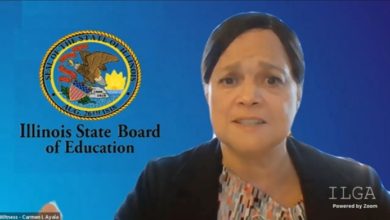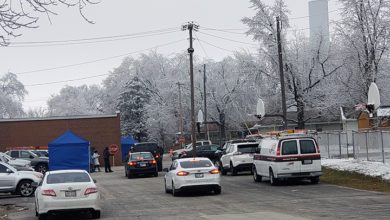Mahomet-Seymour School Board discusses decision making

BY DANI TIETZ
dani@mahometnews.com
Mahomet, Ill. – Members of the Mahomet-Seymour School board gathered on Aug. 5 for a closed session to complete a self-evaluation and to discuss litigation.
Prior to going into the private meeting, board members discussed how the board should move forward in talks between open board sessions.
Board member Ken Keefe added a discussion item to the agenda prior to its approval.
Keefe asked that the Aug. 21 joint session between the Mahomet-Seymour School Board and the Village of Mahomet be moved to an hour past the original start time so that board members and community members with high school students could attend both events.
He also suggested that the meeting be held in the high school auditorium instead of the Mahomet Public Library to give quick access without the travel time.
Mahomet-Seymour High School will host its open house on Aug. 21.
Board President Max McComb asked if all taxing bodies would be at the meeting to discuss a TIF District, but Superintendent Lindsey Hall said, “the board meeting is just the Village Board of Trustees and the School Board, certainly other taxing bodies are invited.”
Board member Meghan Hennesy said, “It seems like we didn’t schedule the week before because we had conflicts with school schedules. There’s no urgency to have that meeting right away, so I feel like if we need to schedule that at a different time, then we should look at that.”
Hall said that she would touch base with the Village and then communicate with board members prior to the next full board session to settle on a date.
Once a motion was made and a second was made to go into closed session, board member Colleen Schultz wanted to know how the decision was made to have the self-evaluation in closed session.
On the suggestion of Keefe, the board previously discussed the pros and cons of holding the self-evaluation in closed or open session. Previously, the board worked with IASB (Illinois Association of School Boards) in closed session.
Per the discussion that ensued, McComb had gauged the opinions of board members via email between the July 15 and Aug. 5 meeting.
“I know there was a lot of back and forth about first we talked about it being closed, then we talked about it being open, then closed,” Schultz said.
“I’m just a person who likes to understand how things are done.”
McComb said that the board had come to the conclusion to hold the self-evaluation in closed session after consulting with Dean Langdon, an IASB Associate Executive Director.
Board member Lori Larson said, “And that’s what your email had said, too. I was one of the people who said maybe we should have it be open. Everybody that’s newly elected, and some of us, I consider myself still sort of newly elected, two years, talked about that being an issue of having everything presented in public and I was one of the people who said the same thing to Max.”
Hennesy wondered when a public vote happened to seal that decision.
“My problem is that if the board is going to make decisions; I saw emails going around saying Lori, Max and Lindsey talked and decided; that’s not actually how boards work.
“Decisions made by boards have to happen with a vote.”
McComb said, “And we are going to vote right now to go into closed session.”
Hennesy continued, “I understand that, but what I’m saying is the language that keeps being used in emails and communication that go on, I guess behind not out in the open because they come via email, there’s a lot of language about what we have decided. And I find that highly problematic.”
“I don’t think it actually said, ‘decided,’ ” McComb said.
“I actually printed the email,” Hennesy said.
“If I said ‘decided,’ I apologize,” McComb said.
“This seems to be a pattern, for me, of behavior of really trying to control how the decisions on this board get made,” Hennesy said.
“It seems to me to be decisions are being made behind the scenes, not including the entire board and not via a vote.
“I think that that’s problematic. And I think that it’s intentional. I’ve heard discussions since being elected to the board, about plans in place to just say make sure that some board members have voices that are heard some members don’t have voices that are heard.
“Then I’ve attended meetings where agenda items haven’t been added, per some board members request, certain items are not on the agenda certain months when certain numbers don’t lie in terms of voting.
“And as we go into tonight’s sessions to talk about board self-evaluation, I’m not even sure we can get to that to be totally honest, because I don’t believe that there’s a good-faith effort by this board to include all voices and to have discussions above board.”
McComb described the emails as a good-faith effort to “try to do what everybody wanted to have done.
“Quite frankly, when I asked for responses or opinions I got one from Jeremy.”
Hennesy said, “The problem is that open meetings act, specifically bans you from having discussions via email. So if I were to reply to that, that starts a discussion. And that violates the open meetings act.
“And so when I say we need to take a look at how this board makes decisions, that’s what I’m talking about.”
McComb said, “Well, I think that that’s something that we can talk about tonight when we are having this meeting.”
Larson talked about unpeeling the onion a little bit.
“I think it’s the board is made up of seven individuals. And I have been on the board for two years. And I have people in the community come and talk about the way that perception comes out of being hostile and unkind. And I feel that and I see that too.
“And in order to make the best effort for our community to do the best service we can, we need to build relationships. And as you are starting tonight, gentlemen, to facilitate our discussion, there is clear not a transparent, not a level of trust.
“The people who are affected by that the most are the people who work in our buildings and pay our taxes and work in our schools and are coming to these meetings now.
“Okay, so there’s just not an equal playing field, you can just want in the effort to be transparent get that out: it comes from the press, it comes from individuals, and there’s not a level of respect and we need to start there before we can unpeel the layers that make and serve our students, faculty and our community the very best.
“I got elected two years ago on a good-faith effort and I have never been blindsided by anything. I feel that level of respect has been there. You can ask questions. And now it’s not so much that way.
“Again, that’s of seven. That’s not putting a 1,2,3,4. That’s not naming anyone, but we really need to start there to be of service to our entire community.”
Hennesy questioned how the board would go about building relationships.
“I’m not sure how you do that we’ve actually heard with fellow board members talk about plans to circumvent your voice and to block votes, and maybe skip meetings in case the numbers weren’t there; to maybe bring contracts and sign them before new board members take over; to have meetings and discussion about how you not have people come to be able to share public comments,” Hennesy said.
“What I’m saying is that I am going to have a hard time getting past just that. Because it’s not me, who had that discussion about circumventing and silencing voices. And yet, I hear back through the community, ‘We’re just not playing nice, we’re just not getting along.’ And I find it really difficult when we haven’t started from a place of honesty. And if we’re going to be real honest, there was an active concerted effort to make sure that voices won’t be able to do stuff.
“And then I’ve been to a couple board meetings where I’ve seen that actually enacted with surgical precision. And so as one of the people that is being told in the community, ‘You just have to play nice you have and learn to get along.
“I am not the person who had those discussions, I am not the person who decided that a plan to maybe skip a a meeting or two if the numbers and the votes weren’t there. That’s not my plan.
“In terms of, you know, does that bug me personally, I mean, I think it’s a little bit childish, but it gets in the way of what we’re supposed to be doing here. And what we’re supposed to be doing here, is working for teachers and kids.”
Larson said that the discussion needed to happen among board members.
“There’s a constant negativity in the world that we live in as a whole, Anybody who opens the newspaper opens any kind of media will see that. I don’t want to play into that.
“We had a discussion when I said I think we can all get along. But it needs to start between all of us. I don’t care what someone that’s not on this board says because when you give me your word, I will take it as fact, Meghan.”
Hennesy clarified where the discussion had taken place.
“I’m not talking about hearing this from other community members, I’m hearing it from the voices in this room, sitting at this table,” Hennesy said.
“I don’t recall myself saying that, but you can back it up with fact,” Larson said. “I just want to make sure that if that’s where we need to start, then, it’s obvious that we need to start because we are going to hurt our community, our schools, our funding, all of that if we don’t make it work.”
Again Hennesy wanted to know how to make that work.
Larson said, “Well, maybe we will talk about that tonight.”
McComb added, “I think that’s what we’re here tonight for.”
Larson said, “This is not ideal, I will say to Max, as the Vice President of the board, when we talked about having this meeting in August, I was like how do you have a board orientation, self-evaluation, three months after you started. That’s because our schedules; this is when it aligned, okay? So our priorities in life, and I’m part of that, too.
“You don’t take over a job, anybody, even myself, and say, ‘Oh, in three months, you’re going to make your plans for it. That’s not efficient. And that’s where we are. This is where we are. So let’s take and build and move forward.”
Keefe brought the discussion back to Hennesy’s original point.
“I think that the appropriate way for a board to make a decision like this is to not try to via email, but simply say in email, ‘at this meeting on Aug. 5, we will discuss and make a decision about whether or not it’s going to be an open or closed session. I think that was the fundamental problem.
“It wasn’t done that way. It was done in a way so that we sent an email out and the email said let’s decide via email how we are going to do it that night. That happens all the time. I don’t quite understand that. It feels like we’re constantly having these decisions happen before the meeting when that’s not a representative body, like us, should be doing.
“It should be done in the meeting where the public can see and participate in the discussion.”
Larson responded, “The public doesn’t participate in the discussion other than the comment period because it is an active session of a board meeting. Those conversations should take place, ‘I need to talk to you about this well in advance so that we can verse all the board members.”
Keefe added, “Actually, that is an existing practice of this board, that’s true, but that’s not a required practice. The public can participate and, like you said, they do participate in the public comment section of our current set-up. So, yes, it doesn’t happen with this board right now with the public participating in the midst of discussion, but it doesn’t have to be that way.
“That’s all I would make a point for this particular decision, is, it’s a good example, it’s a very tame example of where a decision is being made pre-emptively.
“And It’s not an official decision, because, like you said we are about to vote, and that’s the official decision. But if the majority makes a decision privately in the email, not to be deceptive or for some evil reason, anything like that, that’s not what this is about. But the whole point of having a deliberative body like this, is to do this publicly and together, the seven of us.”
McComb recalled the previous open session discussion.
“To be clear, we had discussed in a meeting, we had not made a decision, but we discussed the pros and cons of having it open or closed,” he said.
Hennesy recalled that the majority of the discussion about the self-evaluation and upcoming community engagement project happened prior to three board members being seated.
“A lot of the discussion about to even have this evaluation happened prior to even the election, and then the language used since the election has been the board decided, the board decided,” Hennesy said.
“It seems to me that when you have at half of the board turn over it might behoof you to have a new discussion with the people about some of the decisions that have been made previously, and make sure that people are on board.
“And I never saw a vote of the previous board to actually engage and do this self-evaluation. I never saw a vote to spend the money with the IASB.
“I’m not opposed to doing this. But I think we have a fundamental problem with the way that decisions get made on this board. And as a new board member, I do not feel like it is a level playing field.
“I have heard things that give me great pause and lead me to believe that it will never be a level playing field; that there’s no intention of actually letting people add things to the agenda, or votes or actually have a voice here.
“And that is not what the community asked for with its votes. That is not what I signed up to do here. And it’s going to be extraordinarily difficult to move forward and do the work that’s important for this board to do If all we’re doing is for jockeying for control and spring. And that’s what I feel like is happening.
“And this is just one single example of having been on the board since April 2, but never actually being asked; I mean, I saw an email that said, the three new board members want it in open session.
“I found that interesting because I have never been asked what my opinion was, I have never had the opportunity to talk to the pros and cons of open versus closed. And all I’ve been told is we’ve made this decision and picked a date.
“And I feel like that is one instance among many. And that’s pretty problematic for the work that this board has to do.”
Larson responded, “Well, I think your inference of saying, because you are speaking for me when you say there is division on the board. I will vote for whatever I think is the best decision. I don’t care what someone says. I will not be influenced by that. I was, just like you, elected by my constituents to make the best decisions for the people in the community. And I will do that.
“So put that in tape recorder, write it up, whatever. That’s where my voice is: whatever is best for the community, I will do.
“I don’t want to be, and just like you feel, and you’re stating that there’s been a grouping, I don’t want to be grouped into this side, that side.
“We are a board.”
“As we should be,” Hennesy said.
For Schultz, the discussion was also about developing rules on how each board member engages with each other.
“My husband would tell you this is because he’s heard it ad nauseam when things happen, I think the people that agree with the decision when something is done unproperly are the ones who should stand up the most because they don’t have the sour grapes excuse.
“So you know, in our national politics, if the Congress won’t pass immigration laws, and Obama says if you don’t pass the laws, I will do it with executive order, I think the people who should stand up the most are the ones who agree with immigration because that’s not the way our government runs.
“If the Republicans decide not to vote for a Supreme Court candidate, that’s not the way our government is supposed to run. So the people who don’t want that guy are the ones who should stand up the most.
“I don’t disagree with any of these decisions, I just want to have a procedure, and I want us to follow it whether we’re the majority, the minority, whether we like the outcome, whether we don’t like the outcome; because that’s how you stop having anarchy; that’s how you don’t have dictators because you have rules that you are going to follow no matter what.
“That’s what I’d like to see us come up with and stick with.”
Board member Jeremy Henrichs asked what the motion was to vote on.
McComb clarified that they were voting to go into closed session.
Larson asked Hennesy if all of her questions and concerns had been addressed.
Hennesy said, “I will say same thing in open session that I will in closed session.
“But I have to say that I do not believe that the way that decisions are made or the way that voices are being heard or included or excluded to date has been fair or level. And that is where we have to start because any decision does not have a foundation of fair and level is a mute point.
“I shared with Lindsey when we had our one-on-one, I have real concerns about this board being broken and I have real concerns about the things I heard board members say. I think it violates the oath of office that they took.
“And I’m not sure how we’re going to build trust when I hear one thing at a certain time and another thing at a certain time.
“If you don’t tell the truth all the time; I give this lecture to my children, if you don’t tell the truth all the time, then I don’t ever know when the truth is actually being stated.
“And so I have some real concerns here about how we are going to take what has been said and what I have seen enacted to date and get to a place where we can start doing the work.”
Henrichs agreed that the board has a trust problem.
“I want to be clear,” he said. “I think you have to be careful about somebody who is not telling the truth. I’ve never not told the truth, especially as it related to this board.
“So, yes, I think we definitely have some underlying issues. So I think we’ve got a lot of considerations to work out If we’re going to have any sort of trust, then we’re going to have to work through all those things. But be careful about accusing somebody of not telling the truth.”
Hennesy said she was not accusing anyone of not telling the truth.
Henrichs said, “But that’s what you just said.”
“I have heard people say one thing in one scenario and a different thing in another scenario,” Hennesy clarified. “ You can call that whatever you would like, if you want to put a different word on it.
“What I am saying is, I am going to have trouble knowing which I am going to believe and which one is one that we are going to act on. I don’t know another word for when you say one thing in one situation and a different thing in another situation.
“I have personally experienced that. And so for me, we have more work to do than to decide on how agendas get made.
Henrichs agreed.
“Fundamentally, we are in big trouble if we can’t get past the ‘do I really believe what someone is telling me?’ ” he said.
Hennesy voted present to go into closed session. Keefe voted no. McComb, Schultz, Henrichs, Larson and Merle Giles voted yes.





